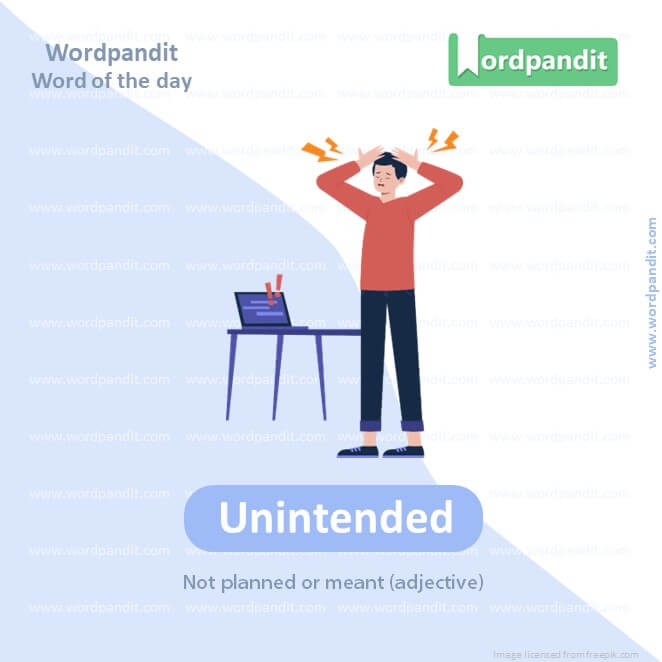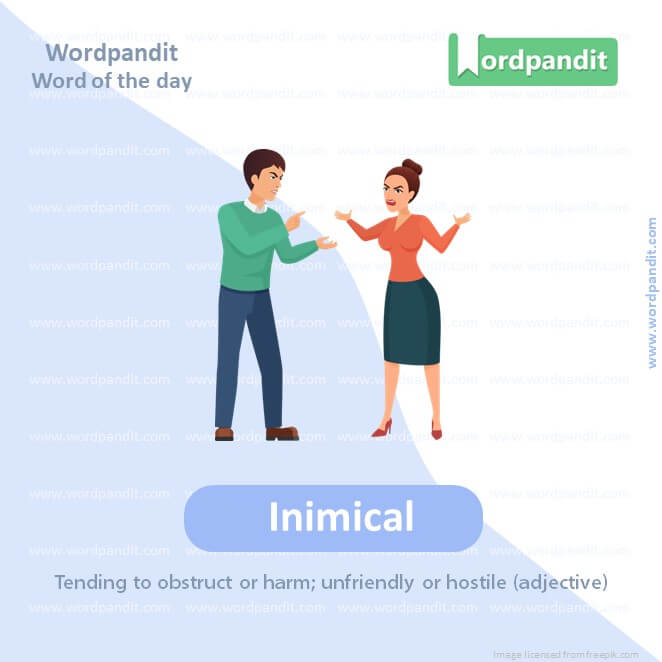Daily Vocabulary Words: List of Daily Used Words
Hi there. Welcome to this special section @ Wordpandit.
Our endeavour here is straightforward: highlighting important daily vocabulary words, you would encounter in The Hindu. This is your repository of commonly used words; essentially, we are posting a list of daily used words. Hence, this has significant practical application as it teaches you words that are commonly used in a leading publication such as The Hindu.
Visit the website daily to learn words from The Hindu.

WORD-1: Unintended
CONTEXT: A wealth tax, on the other hand, will have unintended consequences. Contrary to common belief, investors can actually shield themselves from higher taxes (including wealth tax) by lowering the amount of capital they invest in any venture based on their expected post-tax income.
SOURCE: The Hindu
EXPLANATORY PARAGRAPH: Unintended means something happened that you didn’t plan or expect. It’s like when you accidentally spill water while trying to pour it into a glass.
MEANING: Not planned or meant (adjective).
PRONUNCIATION: un-in-TEN-did
SYNONYMS: Accidental, unintentional, unplanned, inadvertent, unexpected, unforeseen.
USAGE EXAMPLES:
1. The joke had an unintended effect of making her upset.
2. There were unintended consequences to the new policy.
3. He apologized for the unintended mistake.
4. The law had several unintended side effects.

WORD-2: Dilapidated
CONTEXT: With subdivisions in various places, the wing has been raising 81 dilapidated historic structures across the State from the rubble since then.
SOURCE: The Hindu
EXPLANATORY PARAGRAPH: Dilapidated means something is old, broken, and falling apart. It’s like when a toy is used so much that it starts to break and look really worn out.
MEANING: In a state of disrepair or ruin as a result of age or neglect (adjective).
PRONUNCIATION: dih-LAP-ih-day-tid
SYNONYMS: Decayed, decrepit, run-down, tumbledown, ramshackle, derelict.
USAGE EXAMPLES:
1. The old house was dilapidated and needed lots of repairs.
2. They explored the dilapidated ruins of the ancient castle.
3. The furniture in the attic was dusty and dilapidated.
4. She took photos of dilapidated buildings for her art project.
WORD-3: Compiling
CONTEXT: The PWD’s team of conservation engineers is compiling a list of old buildings in the State and chalking out plans to breathe fresh life into them with the assistance of conservation architects and sthapathi (traditional architects).
SOURCE: The Hindu
EXPLANATORY PARAGRAPH: Compiling is like gathering lots of pieces of information or things and putting them together in one place. It’s like collecting all your toys and putting them in your toy box.
MEANING: Gathering information or materials from different sources and assembling them in a systematic way (verb).
PRONUNCIATION: kuhm-PYLE-ing
SYNONYMS: Assembling, gathering, collecting, accumulating, consolidating, amassing.
USAGE EXAMPLES:
1. She spent hours compiling data for her research paper.
2. The editor is compiling a book of short stories.
3. They compiled a list of all attendees for the event.
4. Compiling evidence was crucial for the investigation.

WORD-4: Chalking
CONTEXT: The PWD’s team of conservation engineers is compiling a list of old buildings in the State and chalking out plans to breathe fresh life into them with the assistance of conservation architects and sthapathi (traditional architects).
SOURCE: The Hindu
EXPLANATORY PARAGRAPH: Chalking means drawing or writing with chalk, usually on a blackboard or sidewalk. It’s like when you use chalk to make pictures or write your name outside.
MEANING: Marking or drawing with chalk (verb).
PRONUNCIATION: CHAW-king
SYNONYMS: Drawing, marking, scribbling, sketching, outlining, scrawling.
USAGE EXAMPLES:
1. The kids spent the afternoon chalking pictures on the driveway.
2. He was chalking up the score during the game.
3. Chalking out a plan on the board, the teacher explained the project.
4. Artists were chalking beautiful murals on the street for the festival.
WORD-5: Exhaustive
CONTEXT: There is more groundwork involved in compiling exhaustive and integrated data for built heritage in Tamil Nadu.
SOURCE: The Hindu
EXPLANATORY PARAGRAPH: Exhaustive means very thorough and complete, covering every part or detail. It’s like looking in every corner of your room to find a lost toy.
MEANING: Including or considering all elements or aspects; fully comprehensive (adjective).
PRONUNCIATION: ig-ZAWS-tiv
SYNONYMS: Thorough, comprehensive, complete, in-depth, detailed, extensive.
USAGE EXAMPLES:
1. He conducted an exhaustive review of the literature.
2. The report provides an exhaustive analysis of the issue.
3. They did an exhaustive search of the area.
4. The documentary offers an exhaustive history of the war.

WORD-6: Inimical
CONTEXT: the security of the EVMs depends on some unspecified “source code” and that knowing how something works could compromise its normal operation. Both these notions are inimical to democracy.
SOURCE: The Hindu
EXPLANATORY PARAGRAPH: Inimical means something harmful or unfriendly. It’s like when something or someone makes it difficult for plants to grow or for someone to feel happy.
MEANING: Tending to obstruct or harm; unfriendly or hostile (adjective).
PRONUNCIATION: in-IM-i-kul
SYNONYMS: Harmful, detrimental, adverse, hostile, unfriendly, antagonistic.
USAGE EXAMPLES:
1. Smoking is inimical to health.
2. His comments were seen as inimical to the team spirit.
3. They faced inimical weather conditions during the expedition.
4. The policy is inimical to the interests of small businesses.
WORD-7: Assuaging
CONTEXT: The petitioners’ prayer to return to paper ballots was patently infeasible. However, while it’s unreasonable to submit to doubts every time they’re expressed if assuaging the doubters is expensive, it wasn’t so here.
SOURCE: The Hindu
EXPLANATORY PARAGRAPH: Assuaging means making an unpleasant feeling less intense, like helping someone feel better when they are sad or scared.
MEANING: Making an unpleasant feeling less intense (verb).
PRONUNCIATION: uh-SWAY-jing
SYNONYMS: Alleviating, easing, mitigating, relieving, soothing, calming.
USAGE EXAMPLES:
1. She tried to assuage her guilt by apologizing.
2. The leader’s speech assuaged the fears of the public.
3. Music can often assuage loneliness.
4. He offered an explanation to assuage their concerns about the project.
WORD-8: Proprietary
CONTEXT: A software program being proprietary doesn’t make it more secure; in fact, it may be less so by virtue of fewer people being able to vet it.
SOURCE: The Hindu
EXPLANATORY PARAGRAPH: Proprietary means something is owned by a specific person or company, and they are the only ones who can use it. It’s like if you had a toy that only you could play with because it was yours.
MEANING: Relating to an owner or ownership (adjective).
PRONUNCIATION: pruh-PRY-eh-tary
SYNONYMS: Exclusive, owned, patented, private, trademarked, personalized.
USAGE EXAMPLES:
1. The software uses a proprietary algorithm.
2. She developed a proprietary interest in the company she founded.
3. The data is protected under proprietary rights.
4. They use proprietary technology that sets them apart from competitors.
WORD-9: Immunisation
CONTEXT: The EPI was introduced as the eradication of smallpox virus was on the horizon, and a need to leverage the then immunisation infrastructure and a trained workforce was recognised to expand the benefit of available vaccines.
SOURCE: The Hindu
EXPLANATORY PARAGRAPH: Immunisation is like getting a shield to protect you from getting sick from certain germs. Doctors give you a small shot that helps your body learn to fight off these germs if they try to make you sick.
MEANING: The process by which an individual’s immune system becomes fortified against an agent (noun).
PRONUNCIATION: im-yoo-nuh-ZAY-shun
SYNONYMS: Vaccination, inoculation, vaccination, immunotherapy, preventive treatment.
USAGE EXAMPLES:
1. Children need to complete their immunisation schedule before starting school.
2. The immunisation campaign aims to reach remote areas.
3. Flu immunisation is recommended annually.
4. They discussed new strategies for global immunisation against diseases.

WORD-10: Opportune
CONTEXT: This is an opportune moment to assess the progress made and envision the future.
SOURCE: The Hindu
EXPLANATORY PARAGRAPH: Opportune means a time that is just right for doing something. It’s like when you wait for just the right moment to jump into a game of jump rope.
MEANING: Happening at a particularly suitable or appropriate time; Timely.
PRONUNCIATION: OP-er-toon
SYNONYMS: Timely, favorable, suitable, advantageous, propitious, appropriate.
USAGE EXAMPLES:
1. He waited for an opportune moment to ask for a raise.
2. The weather was opportune for a day at the beach.
3. They launched the product at an opportune time.
4. It was an opportune decision that led to great success.
Vocabulary Words
When delving into the dynamic world of languages, the grandeur of ‘vocabulary words’ is all-encompassing. The importance of ‘vocabulary words’ in effective communication cannot be overstated; it’s these words that form the backdrop of any language, painting intricate pictures of thoughts and ideas.
Starting on the journey of learning ‘vocabulary words’, one should steer clear from rote memorization. The traditional structure of merely repeating words lacks the necessary context and application that actually embeds these words into your memory. To truly master the ‘vocabulary words’, one needs an integrated, immersive approach.
The first step towards mastering ‘vocabulary words’ is to engage with varied language mediums. Expanding beyond textbooks to read fiction, articles, blogs, and other forms of content not only diversifies your vocabulary but also acts as a mirror to reflect the practical application of these words. Essentially, you’re exposed to the words as they are commonly used, allowing you to truly understand their essence.
Empowering this journey, tech tools like language learning apps and memory-enhancing flashcards significantly aid in learning ‘vocabulary words’. These interactive tools provide a more engaging learning experience and hone word retention. Mnemonic devices, associating words with a unique story or visual image, enrich the process and make memory recall more efficient.
Practicing ‘vocabulary words’ by using them in day-to-day conversations exemplifies learning by doing. It also strengthens the neural pathways and improves overall word recall. This, coupled with regular revisions, ensures your grasp over ‘vocabulary words’ remains strong.
In conclusion, learning ‘vocabulary words’ is not just about adding words to your linguistic cupboard, but understanding their essence and utilizing them effectively. An inclusive approach to learning that combines diverse reading materials, technology tools, mnemonic devices and practice can really propel your mastery over ‘vocabulary words’. Remember, language is the bloodline of communication, and ‘vocabulary words’ are its heartbeat. ‘







